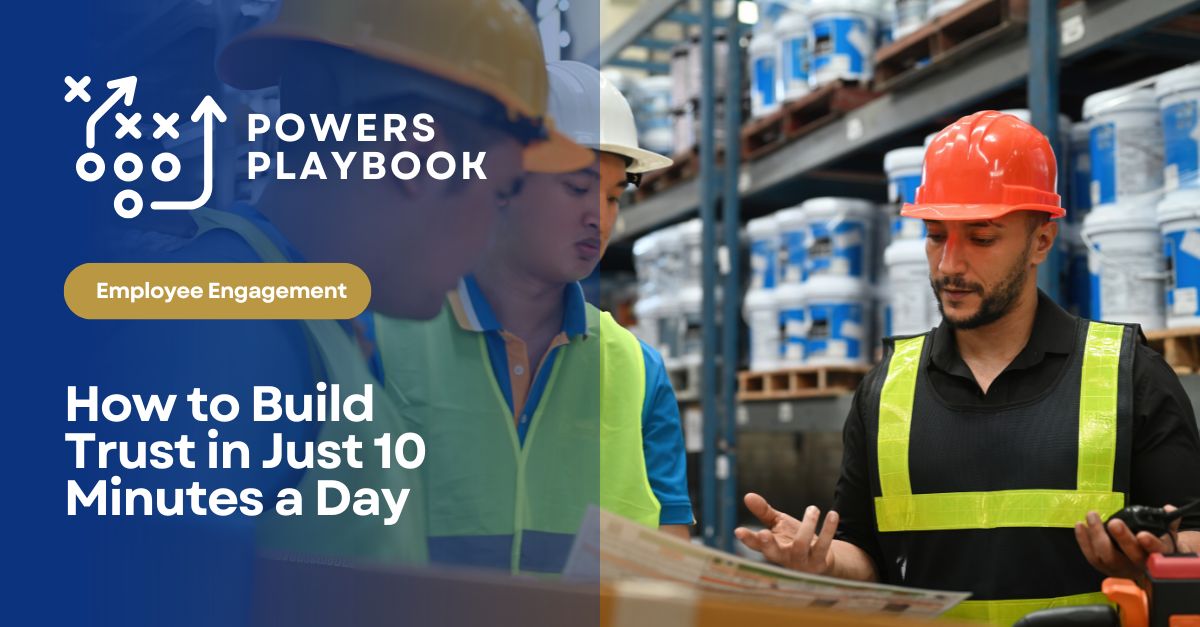
Why Trust Matters on the Shop Floor
Trust doesn’t come from big speeches or once-a-year employee surveys. It’s built in short, consistent moments, the kind you can work into your day without slowing down production.
You don’t have to be everyone’s best friend, you just have to be steady, fair, and approachable.
The truth is, trust is a safety net. Without it, mistakes get hidden, frustration builds, and production suffers. With it, you’ll spot small issues before they turn into downtime, and you’ll have more eyes on the floor looking out for the same goal you are.
The 10-Minute Trust Builder Mindset
If you’ve got ten minutes in your day, you’ve got enough time to build trust. The key is to spread it out. Use those moments while you’re walking the floor, checking a process, or waiting for a machine cycle.
Think of it like maintenance, you wouldn’t wait for a machine to fail before checking it over. Same goes for relationships with your crew. A quick check here, a small adjustment there, and you’re keeping the relationship running smooth.
Five Micro-Habits to Build Trust
Each takes about 2 minutes, fit them in as you go
1Start with a genuine greeting
Don’t just nod and walk by. Make eye contact, say their name, and ask one real question.
Example: “Morning, Chris. How’s that fixture holding up after yesterday’s adjustment?”
A good greeting sets the tone. People notice when you pay attention to them as individuals, not just as “operators” or “line workers.”
2Audit Engagement Like You Audit Processes
Shows you listen and remember what matters to them.
Example: “You mentioned the press was acting up, is it still giving you trouble?”
Following up proves you value their input and you’re not just asking questions out of habit. It also makes them more likely to keep you updated in the future.
3Align Cultures Through Shared SOPs
Don’t wait for a meeting or review. Recognition is most powerful right after it happens.
Example: “That setup change was quick, nice work keeping us on schedule.”
Recognition works best when it’s specific. “Nice job” is fine, but “You knocked two minutes off that setup time” is even better.
4Invest in Leadership and Wellness
Keeps the door open for bigger conversations and improvements.
Example: “What’s one thing we could tweak to make your job easier today?”
You don’t have to agree with every suggestion, but hearing them out builds mutual respect. Even if you can’t make the change right away, acknowledging the feedback matters.
5Tie Engagement to Career Paths
Helps you catch issues before handoff and shows you care about outcomes.
Example: “Anything I should be aware of before I hand this off to the night shift?”
This step can prevent miscommunication, missed maintenance needs, and delays at the start of the next shift.
Making It Stick
- Keep a mental checklist of these habits until they’re second nature. If it helps, jot them down in your pocket notebook or in DPS until they become routine.
- Spread them out through your day so they feel natural, not like a scripted routine.
- Stay consistent, even when things get hectic. Those are the moments your team is watching the most.
The goal is to make these moments part of how you lead, not an extra chore you have to “remember” to do.
The Payoff
- Your crew will see you as consistent and reliable, someone whose word and actions match.
- Communication will flow both ways instead of just top-down, making it easier to solve problems before they grow.
- Problems will surface sooner, and solutions will come faster, cutting downtime and waste.
- People will feel more comfortable speaking up with ideas, which often leads to better performance and fewer headaches for you.
How POWERS Can Help
At POWERS, we help manufacturing teams bake engagement into everyday operations. Our proven approach helps supervisors build consistent leadership habits that improve communication, speed up problem-solving, and keep teams aligned.
With DPS, our digital production system, you can track these habits, reinforce them, and make sure they stick, turning quick wins into long-term gains. The result is stronger teams, smoother operations, and better performance across the board.
Ready to make trust a daily habit that drives performance?
POWERS specializes in practical management consulting for manufacturing, helping turn small frontline leadership actions into big operational results that boost the bottom line.
Our approach builds engagement right into the daily routine, so your crew communicates better, solves problems faster, and works more efficiently. Contact us today to see how we can help your operation lead with trust and deliver stronger performance.
- Speak to an Expert: Call +1 678-971-4711 to discuss your specific challenges and goals.
- Email Us: Get tailored insights by emailing info@thepowerscompany.com
- Request an Assessment: Use our online contact form, and one of our expert manufacturing consultants will reach out to schedule an in-depth analysis of your operations.

